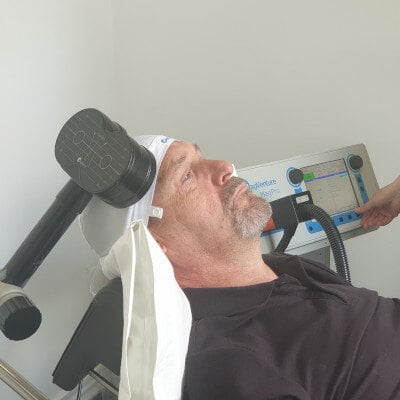Exploring TMS as a First-Line Treatment for Resistant Depression: Is it Worth Considering?
March 8, 2023 - Smart TMS

Seeking treatment for depression can be daunting
Depression affects everyone differently; it’s an incredibly isolating, life-altering condition. Seeking treatment for depression can be daunting, and many people don’t know where to start. The prospect of psychological therapies can be overwhelming. Considering taking medication can also be an anxiety-inducing experience. We live in a time where mental health treatment options are growing, and this is great! Health professionals finally realise that there isn’t a ‘one size fits all’ approach to depression – different individuals need different treatment options.
TMS treatment
Transcranial Magnetic Stimulation (TMS) is a non-invasive depression treatment which is rapidly growing in popularity. Over the last 10 years, TMS has become widely accepted as a 2nd line treatment for treatment-resistant depression – meaning TMS is often advised when treatments such as antidepressants haven’t worked. There are countless studies which demonstrate TMS as a safe and effective method for treatment-resistant depression 1,2,3.
Considering TMS as a first-line treatment
However, many practising clinicians only consider TMS as a second-line treatment option. A recent article in Psychiatry Online (link) has uncovered emerging research to suggest that TMS should also be considered as 1st line treatment option 4. A relatively recent review (2019) published in BMJ Psychiatry indicated that the sooner patients start TMS in their current depressive episode, the better the outcome. Ten articles were included in the analysis and, overall, found a 95% response rate to TMS, with 63% of patients achieving remission who received TMS as a first-line treatment for their depression. Furthermore, the study found people were more likely to continue with TMS as opposed to pharmacotherapy treatments such as antidepressants. TMS displayed no systemic side effects such as weight gain, premature diabetes, or sexual side effects.
Smart TMS results
The article concludes that, given the compelling, emerging evidence, TMS treatment should now be offered as a first-line treatment for depression. At Smart TMS, we’ve seen for ourselves how life-changing TMS can be. Our latest internal audit from patients across our UK clinics (2022) found that 52% of patients went into remission. Additionally, 30% of patients treated completely abolished all depressive symptoms. Overall, 68% of our patients treated saw significant improvements in their depressive symptoms – indicating that 7 out of 10 people with depression will benefit from TMS. We’ve had the privilege of treating over 800 patients at Smart TMS. Our experienced practitioners understand the challenges individuals with depression face. This emerging research about TMS as a first-line treatment option is promising; it offers so many people an alternate treatment method to consider on their journey to recovery. Author, Ben, Smart TMS Manchester Practitioner References:
- Sonmez AI, Camsari DD, Nandakumar AL, Voort JL, Kung S, Lewis CP, Croarkin PE. Accelerated TMS for depression: a systematic review and meta-analysis. Psychiatry research. 2019 Mar 1;273:770-81.
- Rizvi S, Khan AM. Use of transcranial magnetic stimulation for depression. Cureus. 2019 May 23;11(5).
- Sackeim HA, Aaronson ST, Carpenter LL, Hutton TM, Mina M, Pages K, Verdoliva S, West WS. Clinical outcomes in a large registry of patients with major depressive disorder treated with transcranial magnetic stimulation. Journal of Affective Disorders. 2020 Dec 1;277:65-74.
- Voigt J, Carpenter L, Leuchter A. A systematic literature review of the clinical efficacy of repetitive transcranial magnetic stimulation (rTMS) in non-treatment resistant patients with major depressive disorder. BMC psychiatry. 2019 Dec;19:1-1.










